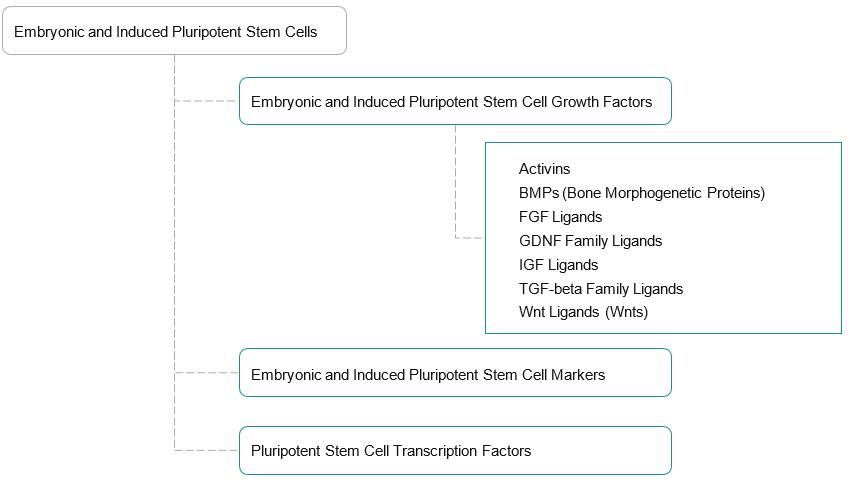Embryonic and Induced Pluripotent Stem Cells
About Embryonic and Induced Pluripotent Stem Cells
Embryonic stem cells (ESCs) are a class of highly undifferentiated cells with developmental totipotency that can differentiate to form all tissues and organs of the body. The ESCs we use for scientific research and clinical applications are usually derived from inner cell mass (ICM) in blastocysts or primordial germ cells (PGCs) in the primordial germinal bluffs of early embryos. Induced pluripotent stem cells (iPSC) are adult cells that have been reprogrammed to an embryonic-like pluripotent state. These cells can be directed in vitro to induce differentiation to form many types of tissue cells, including cells of neural origin, blood cells, pancreatic cells, cardiomyocytes, skeletal muscle cells, and hepatocytes, due to their ability to self-renew and differentiate into various cell types.
Applications of Embryonic and Induced Pluripotent Stem Cell
Research Applications of Embryonic Stem Cells:
- Study of development and disease ontogeny
Theoretically, ESCs can differentiate to produce cells in all tissues of the body. ESCs can be induced to differentiate into specific tissues through gene transcription or translation, etc. The differentiation process of ESCs can be monitored to determine the gene expression during different developmental periods, which will provide a good platform for researching developmental patterns and understanding the mechanism of disease occurrence.
- Research on therapeutic functions
In addition, inducing ESCs to differentiate and form various types of tissue cells can be used for the treatment of diseases caused by degeneration, necrosis, regression, and defects of tissues or cells, as well as for the reconstruction of organ functions. It has been shown that ESCs have been applied in research for the treatment of blood, liver, and kidney diseases. They can also be used in the treatment of burns and wounds.
- Models for new drug screening and toxicity evaluation
In addition, ESCs have been used as models for new drug screening and toxicity evaluation. However, there are still a lot of problems in the research of ESCs, including immune rejection and ethical problems in the clinical application of ESCs.
Research Applications of Induced Pluripotent Stem Cells:
- Potential use of iPSCs for the treatment of human genetic diseases
Rudolf Jaenisch's laboratory has induced mouse tail tip fibroblasts into their iPSCs and further induced differentiation of iPSCs into hematopoietic precursor cells in vitro. Transplantation of these iPSCs into a humanized mouse model of sickle cell anemia significantly improved the anemia and other pathological symptoms of the experimental animals. This result revealed the possibility of using iPSCs for the treatment of human genetic diseases.
Later, their group reported the in vitro targeted induction of iPSCs differentiated into neural stem/precursor cells and further differentiated into neurons and glial cells. When these neural stem/precursor cells formed by in vitro-induced iPSCs were injected into the brains of fetal rats, it was found that they could migrate to almost all brain regions and form excitatory neurons with firing action potentials. Transplantation of dopaminergic neurons formed by in vitro directed induction of iPSCs into a rat model of Parkinson's syndrome significantly improved the motor and cognitive abilities of rats with Parkinson's syndrome.
- Basic research, diagnostics, cell therapy, and new drug screening
In addition, the in vitro reprogramming of somatic cells into iPSCs is widely recognized as providing new avenues for basic research, diagnostics, and cell therapy. iPSCs can also be used as a tool to study the mechanisms of disease development and can be used for new drug screening. Furthermore, similar to human ESCs, iPSCs can be used in toxicological and pharmacological assays. iPSCs differentiated in vitro can be used to evaluate embryonic toxicity and teratogenicity factors.
Research Tools for Embryonic and Induced Pluripotent Stem Cells
Creative BioMart is a leading company specializing in life sciences research tools and services, providing researchers with a wide range of products and resources related to embryonic and induced pluripotent stem cells, such as:

Creative BioMart offers a wide range of products for the above growth factors/markers associated with embryonic and induced pluripotent stem cells, including, but not limited to, recombinant proteins, native proteins, cell and tissue lysates, transfected and stabilized cell lines, protein pre-coupled beads, antibodies, chromatography reagents, assay kits, and other type products. Customized services are also available to meet specific research needs.
In addition to products and customization services, Creative BioMart provides resources on related pathways, protein functions, interacting proteins, related articles, related articles, related research areas, and more to support researchers in their studies of embryonic stem cells (ES) and induced pluripotent stem cells (iPS). Please visit the Product Details page for more specific resources on embryonic and induced pluripotent stem cells.
Our Advantages

We hope that this resource page will provide you with valuable insights into research in the field of embryonic and induced pluripotent stem cells. For more information or inquiries, please feel free to contact us .


